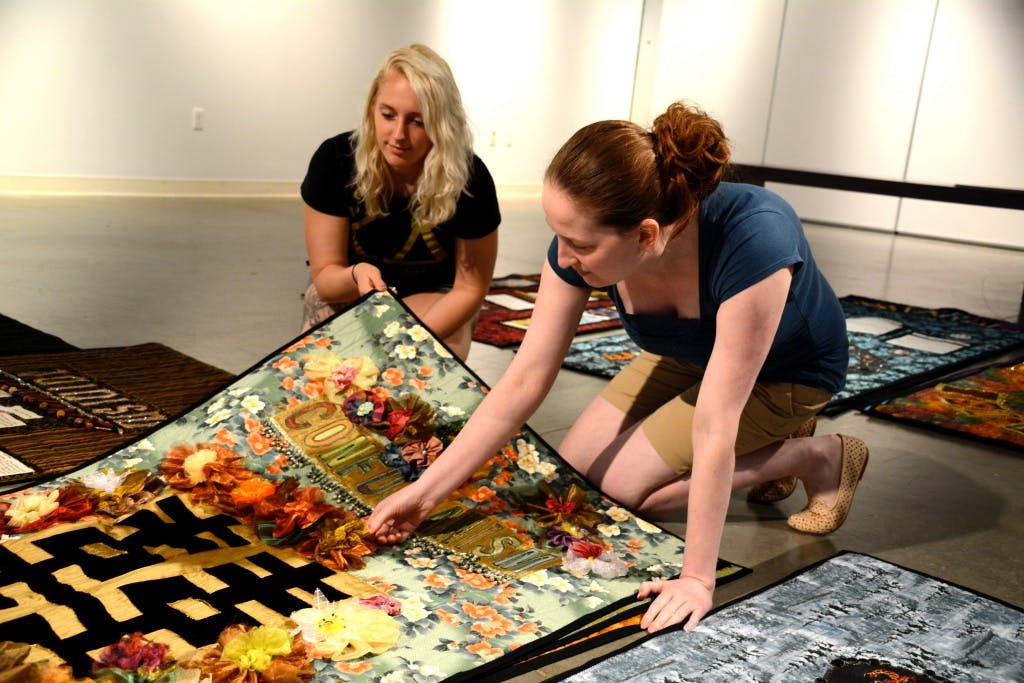17 Textiles Featured in Unique Presentation with June 14 Opening Reception
All the world’s major faiths and traditions share a central belief in The Golden Rule, which essentially states that we should treat others as we wish to be treated.
PICTURED: Maraya Wahl (LEFT) and April Neff, summer interns at the Quaker Heritage Center, look through several of the colorful quilts before hanging the exhibit.
The Meriam R. Hare Quaker Heritage Center at Wilmington College is presenting the exhibit, “Quilting The Golden Rule,” this summer featuring 17 intricately woven quilts representing The Golden Rule or Law of Reciprocity as taught by the major world faiths and humanist philosophies.
The opening reception will be June 14, from 6 to 7:30 p.m., with summer gallery hours planned Monday through Thursday, from 11 a.m. to 4 p.m., and by special appointment arranged through the QHC director, Dr. Tanya Maus. Normal gallery hours, Monday through Friday, from 10 a.m. to 4 p.m., will go into effect Aug. 13.
Textile artist Janet Bear McTavish created the quilts, which are on-loan from the Dayton International Peace Museum. The series of 17 quilts will be displayed in a walk-through format in the QHC Gallery.
In addition to representing The Golden Rule as defined by such major world faiths as Christianity, Judaism, Hinduism, Islam and Buddhism, quilts also portray it as represented in such traditions as Humanism, Native American, Wicca/Neo Wicca, Baha’i, Unitarian Universalist, Sikh, Yoruba IFA, Confucianism, Shinto, Taoism, Jainism and Zoroastrianism.
The exhibit also features several peaceful images on quilts: “Peace Waterfall,” “Peace Garden,” Watching” and “Angel of Peace” that complement the artist’s inspiration for the exhibit.
Each of the quilts is accompanied by text explaining how the faiths and traditions interpret The Golden Rule, along with basic history and tenets of the respective religions and traditions.
McTavish said the idea for the “Peace Labyrinth” came from a dream she had in the wake of the terrorist attacks on Sept. 11, 2001, when she became concerned about Americans’ increasing fear of those holding religious beliefs out of the mainstream in America.
She recalled walking through a labyrinth passing cubicles representing all the world’s major faiths and religions, each of which shared their version of The Golden Rule.
“In my dream, I also carried a rock with me that represented all the negativity and uneasiness people feel when confronted by new ideas, different perspectives and cultures that are unfamiliar,” McTavish said, noting that she came to a peaceful waterfall where she was “encouraged to leave my rock and my own discomfort behind, and to find peace.”
Upon awakening from her dream, McTavish realized she needed to share her revelation with others.
The resulting exhibit, “Quilting The Golden Rule,” takes viewers from the earliest of humankind’s struggles to understand their environment through history to the present time. Completed in 2012, the exhibit has been viewed by thousands of persons.

QHC’s Quilt Exhibit Portrays The Golden Rule from Perspective of World Faiths
Quaker Heritage Center